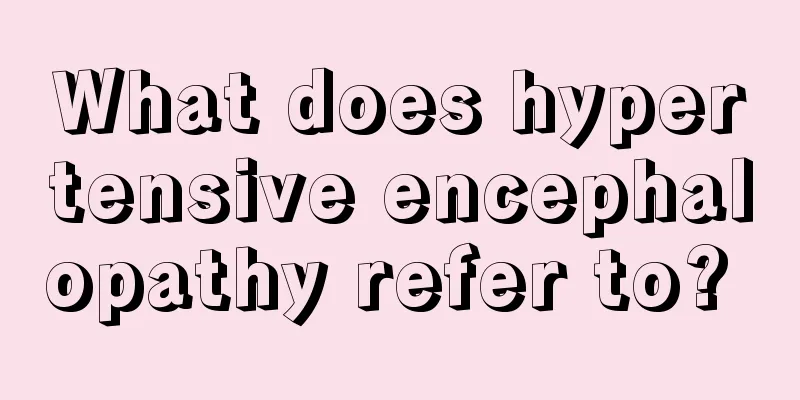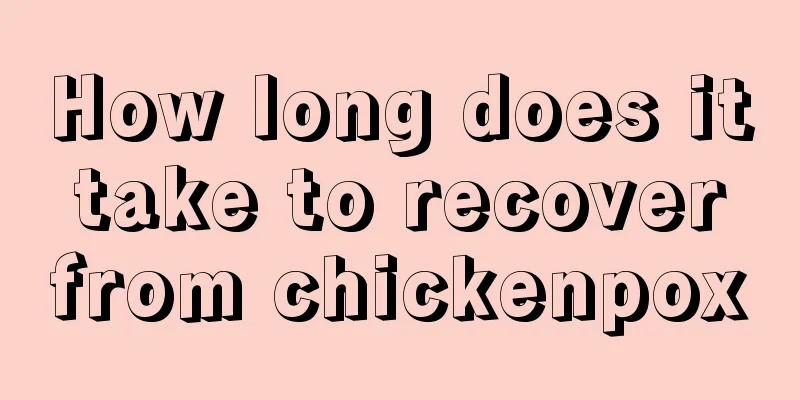What does hypertensive encephalopathy refer to?

|
Hypertensive encephalopathy mainly refers to a series of adverse symptoms caused by a sudden increase in blood pressure that exceeds the range of automatic regulation of cerebral blood flow, such as temporary cerebral circulation disorders. The causes of hypertensive encephalopathy include primary hypertension or secondary hypertension. Hypertensive encephalopathy refers to a series of clinical manifestations of temporary cerebral circulatory dysfunction caused by a sudden increase in blood pressure that exceeds the threshold of cerebral blood flow autoregulation (central aortic pressure greater than 140 mmHg), resulting in hyperperfusion of cerebral blood flow, excessive capillary pressure, and increased permeability, leading to cerebral edema and increased intracranial pressure, and even the formation of brain herniation. 1. Essential hypertension The incidence of hypertensive encephalopathy is about 1% among patients with primary hypertension. It is more likely to occur in those with a long history of hypertension and obvious cerebral vascular sclerosis. It may also occur in patients who previously had normal blood pressure but suddenly develop hypertension, such as patients with rapid hypertension and acute glomerulonephritis. Hypertensive patients with renal failure are also prone to hypertensive encephalopathy. 2. Secondary hypertension Secondary hypertension such as hypertensive disorder complicating pregnancy, glomerulonephritis-related hypertension, renal artery stenosis, and pheochromocytoma are prone to hypertensive encephalopathy. 3. Certain drugs or foods induce hypertensive encephalopathy Rarely, patients with hypertension who take monoamine oxidase inhibitors while also taking rauwolfia, methyldopa, or postganglionic sympathetic inhibitors may develop symptoms similar to those of hypertensive encephalopathy. Eating foods rich in amines can also induce hypertensive encephalopathy. 4. After carotid endarterectomy After carotid endarterectomy in patients with severe carotid stenosis, a sudden increase in cerebral perfusion can also cause hypertensive encephalopathy. Hypertension is a very harmful disease. Patients mainly rely on long-term antihypertensive drugs and daily diet to control it, but patients still need to pay attention to avoid the occurrence of various complications. |
<<: What should I do if I have thick white tongue coating and bad breath?
>>: Can pneumoconiosis be cured? Treatment principles to know
Recommend
Viral meningitis
Meningitis has a great impact on the human brain....
What to do if a mosquito bite causes yellow discharge
Summer is here, the weather is hot, and all kinds...
How often should women check for HPV? What are the ways to prevent cervical cancer?
At present, many women pay more and more attentio...
What are the uses of wine dregs
Everyone must have drunk wine, which is that sour...
What are the causes of vomiting in gallbladder cancer
Nearly half of patients with early-stage cardia c...
TCM standard treatment for stage 2 nasopharyngeal carcinoma
Nasopharyngeal carcinoma is a cancer that everyon...
Will EB turn negative after neck lymph node dissection for nasopharyngeal carcinoma?
For nasopharyngeal carcinoma metastases to lymph ...
How to prevent liver cancer and reduce the chance of developing it? The best way to prevent liver cancer is to get vaccinated.
The main way to prevent liver cancer is vaccinati...
What medicine should I take for sweating on my head and face
Many people sweat a lot in the summer. Although t...
Autonomic nervous system disorders, these four treatment methods are effective
Autonomic nervous system disorders can cause diso...
What should I do if viral encephalitis is serious? Find the cause of the disease and treat it
Viral encephalitis is a very serious malignant di...
What to do if you swallow a fish bone
It is a consensus among most people that fish is ...
Can I take a shower after having my blood drawn?
Nowadays, more and more people are donating blood...
What is Bartholin's gland cyst?
Many people do not understand what Bartholin'...
What are the symptoms of iodine deficiency in humans
Our body needs many trace elements to coexist and...









